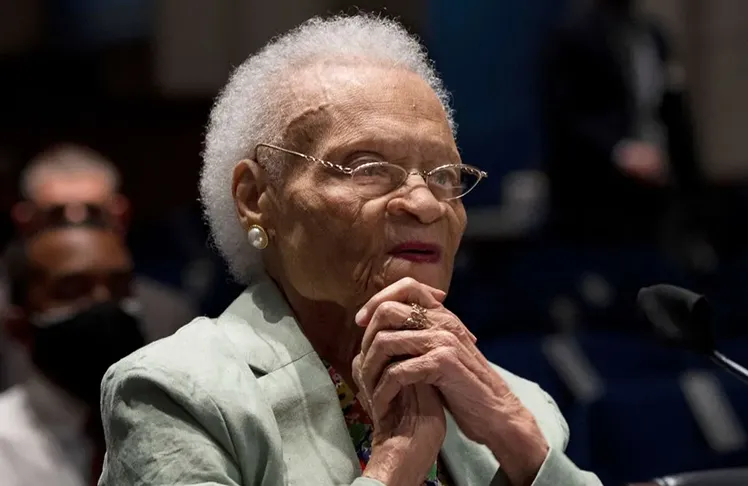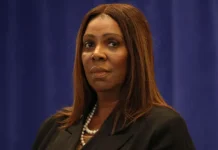
For more than a century, rest never came easily to Viola Ford Fletcher. When she closed her eyes, the horror of what she experienced in 1921 in the Greenwood section of Tulsa haunted her dreams.
“When I sleep, it is never very deep or for very long because of the anxiety and the things I see,” she explained in “Don’t Let Them Bury My Story,” her 2023 memoir. “Imagine having the same horrible nightmare every night for 100 years.”
On Monday, “Mother Fletcher,” as she was called, the oldest living survivor of the Tulsa Race Massacre, died surrounded by family. She was 111.
Her grandson, Ike Howard, told CNN that she left this world with “a beautiful smile” on her face. “She loved life, she loved people,” he said.
The Child Who Watched Black Wall Street Burn
Fletcher was just 7 when 10,000 angry white Tulsans — armed with guns and biplanes, fueled by alcohol and envy, driven by talk that a Black man had accosted a white woman — descended on Greenwood, a thriving African American community known as Black Wall Street, on the evening of May 31. By noon on June 1, when the Oklahoma National Guard reclaimed the streets, an estimated 300 men, women, and children lay dead or dying, and 1,200 homes had been looted, destroyed, or both.
A Justice Department report issued in January, just days before President Joe Biden left office, marked the first time the federal agency publicly acknowledged how the white mob “murdered hundreds of residents of Greenwood, burned their homes and churches, looted their belongings, and locked the survivors in internment camps.”

Nearly every Black family in Greenwood — about 10,000 people — was left homeless.
That the DOJ finally spoke the truth is due to Fletcher and other survivors who testified before Congress in May 2021, 100 years after the terror they endured.
“I will never forget the violence of the white mob when we left our home,” she told lawmakers. “I still see Black men being shot, Black bodies lying in the street. I still smell smoke and see fire. I still see Black businesses being burned. I still hear airplanes flying overhead. I hear the screams,” Fletcher testified.
“I have lived through the massacre every day. Our country may forget this history, but I cannot.”
The Courage to Tell the Truth
Having told the truth that Tulsa — and America — attempted to bury, Fletcher sought justice. She and other survivors sued the city in 2020, seeking reparations for what they said was the complicity of local officials in the massacre.
Indeed, the Justice Department report found that “the massacre was the result not of uncontrolled mob violence, but of a coordinated, military-style attack on Greenwood” — a ruthless assault plotted in part by real estate speculators, businessmen, and elected city leaders. Their case went all the way to the Oklahoma Supreme Court, which upheld a lower court’s dismissal in 2024.
In June, Mayor Monroe Nichols IV announced that the city would attempt to raise $105 million by 2026 — the massacre’s 105th anniversary — to compensate the survivors’ descendants.
Viola Ford Fletcher entered this world in 1914, the daughter of sharecroppers, and died as one of the most important eyewitnesses to American history. The night of the massacre, she and her family fled in a horse and buggy — through gunfire. She remembered seeing a white man shoot a Black man in the head, point-blank.
“The neighborhood I fell asleep in that night was rich — not just in terms of wealth, but in culture, community, heritage. Within a few hours, all that was gone,” she told Congress in 2021.
A Legacy of Survival and Courage
With Fletcher’s death, just one living survivor remains: Lessie Evelyn Benningfield Randle, also 111, six months younger than Fletcher. When Fletcher fell ill, Randle sent word through her granddaughter: “She was sorry it was happening and that she loved her.”
As news of her death spread, tributes flooded social media.
“I will miss you, Mother Viola Fletcher. So triumphant. So gracious. So courageous. So present. Thank you,” Dr. Bernice King wrote on Threads.
Fletcher witnessed what no child should, yet died knowing that no one was held accountable for the trauma she carried through a lifetime. She saw the election of the nation’s first Black president, Barack Obama, traveled to Ghana at age 107, and met Biden at the centennial observance of the massacre. But the justice she and her community deserved eluded her.
Now, after 111 years, the nightmare that stalked her is over.
At long last, Viola Ford Fletcher can finally rest.















